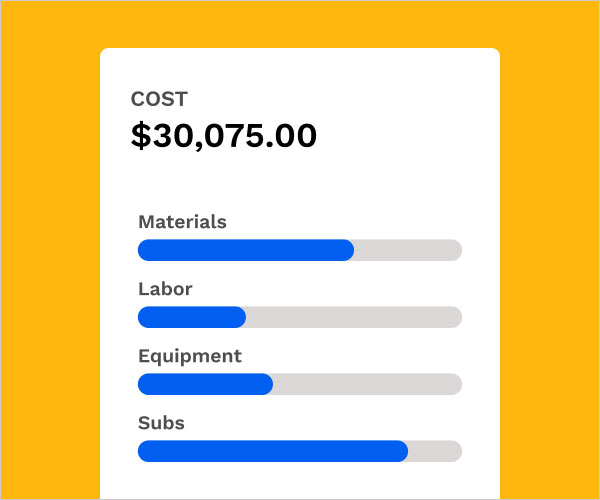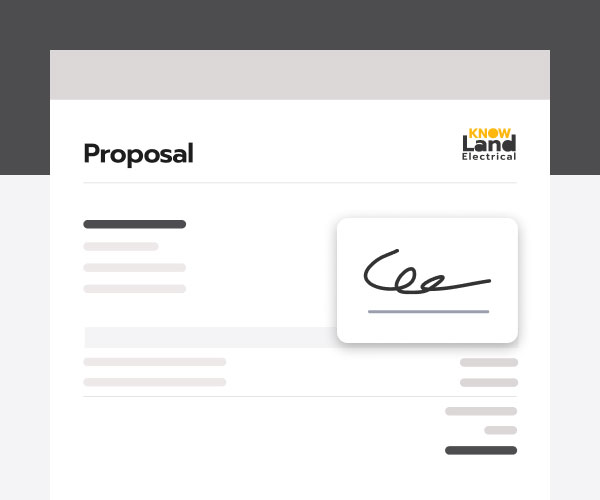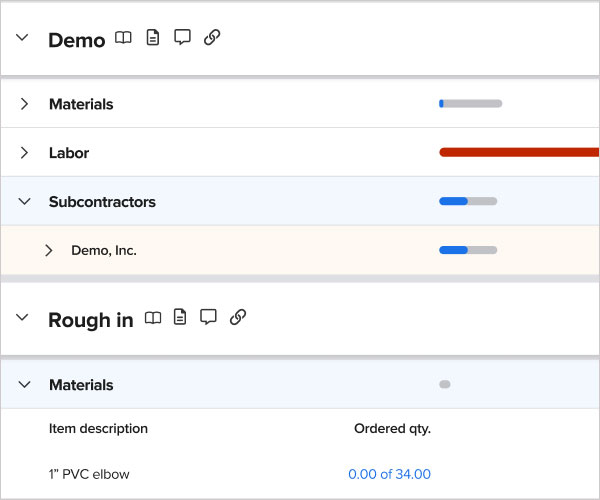Construction project budgeting
Turn your construction budgets into accurate estimates
Keep your margins healthy and adjust quickly to changing costs with Knowify’s construction project budgeting tools. Knowify tracks project costs as they happen and automatically updates those costs against your budget so you always know where you stand.

Turn construction budgets into to professional proposals
Getting proposals out quickly can help you win more bids. But sacrificing accuracy for speed by working without a project budget can result in undercharging for your work.
- Get accurate proposals in front of GCs quickly by turning project budgets into proposals in minutes.
- Avoid unforeseen costs by creating budget templates from prior similar jobs.
- Ensure you hit the right margin by seeing your projected profit on a job as you build your proposals. Easily adjust markup as needed.


Find and correct cost hikes before they hurt your bottom line
Once you’ve won the job, Knowify allows you to quickly spot cost overruns and see in real-time how they are affecting your cash flow.
- Account for scope of work changes by tracking actual costs against your budget and issuing change orders as needed right from Knowify.
- Take advantage of simple, real-time WIP reporting, so you’re never in doubt about where you stand on a project.
Create a construction project budget you can easily follow
It’s hard to maintain healthy profit margins on projects if your budget doesn’t include all of your estimated costs. Knowify’s easy-to-use budgeting software allows you to build a budget that accounts for hard costs like materials, labor, and equipment usage to keep your expenses aligned with your bids. You can even pull hard costs from your product and service catalog to speed up this process.
“Creating bids, budgets, and tracking expenses is easy and intuitive.”
Source: G2 Crowd
Build your business with confidence
Detailed budgeting can be the difference between a business that’s struggling to stay afloat and one that’s thriving. Try Knowify free for 14 days, and see how better budgets can help your bottom-line!
FAQs
What is budgeting in construction projects?
In construction, a project budget is a detailed financial plan that covers your estimated costs for completing a project. Budgets can be as detailed as you’d like, but in general, Knowify recommends breaking your project down into phases and then cost categories for each phase.
Doing so allows you to clearly track the expenses related to each part of your project so that you can stay on track and not exceed your projected costs. Staying on budget ensures that you end up making money on your project.
When you finish a project, you can use your budget to look back and find the areas where you budgeted too little or too much. With this information you can make changes to how you estimate costs, execute projects, or both, so that you make more money on future jobs.
What should be included in a construction budget?
Knowify recommends breaking down your project into phases and then including cost categories for each phase. The main cost categories you’ll want to account for are your direct costs (costs directly related to completing the project. These costs are materials, labor, equipment, subcontractors, and miscellaneous.
Material costs include the materials you’ll use to complete the project. These are related to your trade but examples include lumber, wire, fasteners, paint, and so on.
Labor costs include the wages and labor burden for your team that completes the work.
Equipment costs include any machinery or tools used to complete the project. This includes both owned and rented equipment.
Subcontractor costs include the cost to hire any subcontractors you might need to complete the project.
Miscellaneous costs include any costs directly related to project execution that don’t fall into the above categories.
Knowify doesn’t recommend including indirect costs (costs that are needed to run your business, but not related to project execution) in your project budget. A prime example of this are overhead costs like utilities and rent for your office space.
How do you price a construction project?
In order to price a construction project, Knowify recommends starting with a project budget that accounts for your cost to complete the project. From there, you should apply a markup to the budget that allows you to hit your target profit margin while also covering your indirect costs. If you aren’t sure what that markup or margin should be, we recommend working with an accountant or other financial professional that can help you calculate a figure that works for your business.
What is the best software for project budget management?
Trade contractors and general contractors should look for software that allows them to quickly create detailed project budgets broken down by phases and cost categories.
The software they choose should allow them to track expenses and payments related to each phase of the project in an easy way. They should also be able to see their project budget update in real-time based on this information.
Lastly, while job costing and project budgeting is a critical part of the construction management process, it’s important that this process and software works alongside your accounting software, like QuickBooks Online. This allows you to have a complete financial management solution that makes it easy to do budgeting job costing from the field, while giving your bookkeeper and accountant access to the most up-to-date financial information for each project.
If this sounds interesting to you, you can try Knowify free for 14 days.